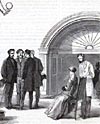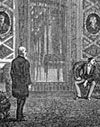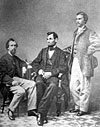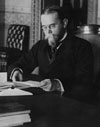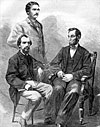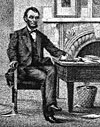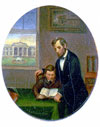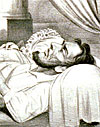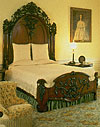The second floor of the White House included the family quarters of the White House – as well as the offices and bedroom of Mr. Lincoln’s two principal aides. The office Mr. Lincoln called “the shop” was also the government’s crisis center. A crisis like the Civil War generates problems – people seeking solutions to those problems often ended up on the second floor of the White House during Mr. Lincoln’s Administration. Much of Mr. Lincoln’s reputation as president is based on how he interacted with those visitors. He did not strive for popularity, but the manner of his behavior contributed to his popularity. Indeed when New England intellectual Ralph Waldo Emerson visited in 1862, the President recalled Emerson’s own words: “I once heard you say in a lecture that a Kentuckian seems to say by his air and manners, ‘Here am I; if you don’t like me, the worse for you.”1
“Even many who came…loaded with false ideas left their burdens on the steps of the White House when they came away from their interview. If it had been possible and if Mr. Lincoln could have met such a popular representation, newly selected every month in the year and many by man, there would have been small misunderstanding of him by the people,” wrote William O. Stoddard, one of Mr. Lincoln’s assistants. “In one manner he was actually so doing, for men and women were continually coming to him with their sorrows and petitions. Now it was a mother asking for her sick or wounded son, that she might take him home with her and nurse him back to health. Then it was another mother, who had give four of her sons to her country and three had fallen in battle and but one was left, and she wanted him. Then it was a group of anxious men and women pleading for the forfeited life of some deserters, or for the establishment of a hospital, or for some other mitigation of the horrors of the war.”2
“It is one of the tribulations which must greatly add to the fatigues of office at this juncture, that our amiable President has to give so much of his time and attention to persons who apparently having no business of their own, expand a large degree of their surplus energy in benevolently minding the business of the President,” editorialized the National Intelligencer in 1863.3
Donn Piatt, a journalist-turned-soldier, recalled an instance in which the President complained about the ineffectiveness of Union armies. A general suggested to him that one problem was that the Confederates had superior discipline because deserters were shot. “Why do you interfere?” asked the General, who said that Congress had removed responsibility for such cases from the president. “Yes, Congress has taken the responsibility and left the women to howl all about me,” replied Mr. Lincoln.4
President Lincoln took responsibility – for the lives of sleepy sentinels who neglected their duty, for mothers who pleaded their cases, and for the conduct of a war that seemed to be out of control. In 1864 he declared: “I claim not to have controlled events, but confess plainly that events have controlled me.” 5 But President Lincoln was hardly passive, noted historian Don E. Fehrenbacher: “Without denying that the statement is an honest expression of humility, one can nevertheless read the words also as an effort to disclaim responsibility, or at least lighten its intolerable weight. Yet at other times, he had spoken differently. ‘We – even we here – hold the power, and bear the responsibility,’ he told members of Congress in December 1862.”6
His attitude toward the only son to occupy the White House throughout the whole war, Thomas “Tad” Lincoln, was considerably different. Tad had free rein to do as he pleased, to terrorize or befriend whomever he wished. He was his father’s joy, in a job that frequently lacked joy. Unlike his mother, Tad exercised unlimited access to Mr. Lincoln’s office, no matter who else was present. He was a vibrant life force in a building preoccupied with death. Mr. Lincoln had less tolerance for the more mature interventions of his older son. When Robert wrote him on behalf of an office-seeker, President Lincoln wrote back to the Harvard student: “If you do not attend to your studies and let matters such as you write about alone, I will take you away from college.”7
The horror of the war’s casualties was seldom far from Mr. Lincoln’s mind, and William Stoddard maintained that inexorably the war drained the life from Mr. Lincoln as well: “To one friend he said: ‘The springs of life are wearing away, and I shall not last.’ To another, in apology for telling a humorous story: ‘If it were not for this occasional vent, I should die.’ To another: ‘I feel a presentiment that I shall not outlast the Rebellion. When it is over, my work will be done.’ To another: ‘Whichever way it ends, I have the impression that I shall not last long after it is over.’ In 1864, Mrs. [Harriet Beecher Stowe] asked him ‘what policy he proposed to pursue after the war.’ With a mournful sort of laugh, he replied: “After the war? I shall not be troubled about that. The war is killing me.’”8
Footnotes
- Don E. and Virginia Fehrenbacher, Recollected Words of Abraham Lincoln, p. 152.
- William O. Stoddard, Abraham Lincoln: The Man and the War President, p. 407.
- Kenneth A. Bernard, “Glimpses of Lincoln in the White House,” Abraham Lincoln Quarterly, December 1952, p. 169
- William Barton, The Life of Lincoln, pp. 255-256.
- Roy P. Basler, editor, Collected Works of Abraham Lincoln, Volume VII, p. 282.
- Don E. Fehrenbacher, Lincoln in Text and Context, p. 162.
- Stoddard, Abraham Lincoln: The Man and the War President, p. 49.
- Stoddard, Abraham Lincoln: The Man and the War President, pp. 408-409.

